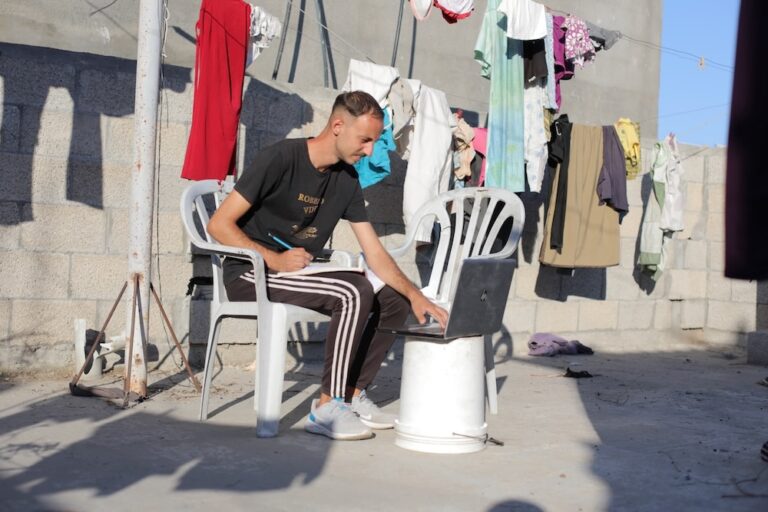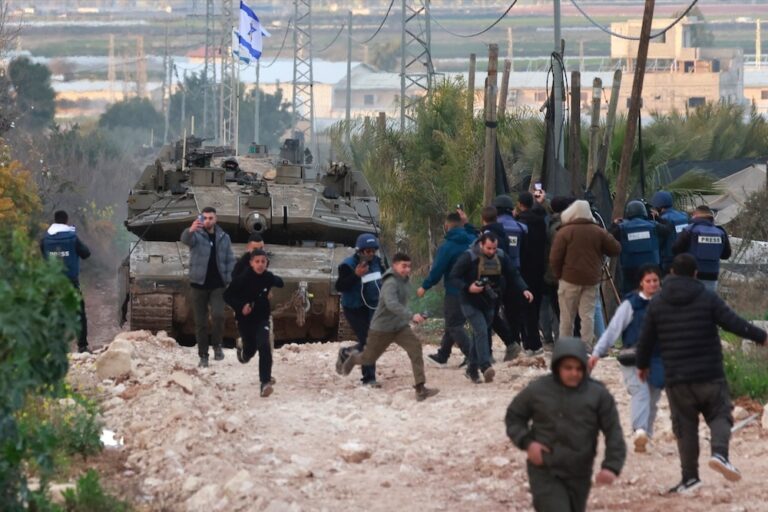October 2024 in MENA: A free expression and civic space round-up produced by IFEX’s Regional Editor Naseem Tarawnah, based on IFEX member reports and news from the region.
Escalating violence targets journalists in Lebanon and Gaza while damaged networks severely restrict access to life-saving information. Draft law fails to address arbitrary detentions in Egypt, rising executions in Saudi Arabia, and combating impunity for crimes against Syrian journalists.
“Without accountability, there will be no red lines and no rock bottom”
In recent weeks, attacks on journalists in Lebanon and Gaza have surged, amid a growing climate of Israeli impunity. The 25 October Israeli airstrike that killed three media workers at a guesthouse in Hasbaya, Lebanon, has amplified calls for accountability and investigations into possible war crimes, as well as protection for journalists working under harrowing conditions.
The airstrike, which killed Ghassan Najjar and Mohamed Reda from Al-Mayadeen and Wissam Qasim of Al-Manar, hit a facility that housed 18 media personnel while they were sleeping. Despite clear press insignia, the attack appears intended to silence media voices, raising fears among reporters in Lebanon and Palestine.
“These crimes against journalists cannot go unpunished, and the international silence puts the lives of more journalists and civilians at extreme risk. Silencing the media in wars paves the way for major crimes against humanity.” – Maharat Foundation
A new report from Maharat Foundation highlighted Lebanese journalists’ experiences of attacks and restricted access to information, emphasising the urgent need for accountability and protection for those providing vital coverage.
Justice remains elusive for Reuters reporter Issam Abdallah, targeted by Israeli forces while reporting in south Lebanon a year ago. Six independent investigations, including one by RSF, confirm that the journalist was targeted by the Israeli army. “I don’t feel at all that we are getting half of the justice that Issam deserves,” his sister shared in a recent interview.
In Gaza, Israel’s war has resulted in the deaths of over 180 journalists, the closure and destruction of 34 Palestinian media institutions, and hundreds of documented violations against media professionals amid a staggering death toll. Advocacy groups argue that these assaults reflect a broader pattern of impunity that further emboldens such violence, leaving journalists increasingly vulnerable.
Israeli forces accused six journalists of being affiliated with groups Hamas and Islamic Jihad. Those named include Talal Mahmoud, Anas Al-Sharif, and Hossam Shabat, all reporters recently bearing witness to the ongoing war crimes perpetrated by Israel during its latest military operations in northern Gaza, where the civilian population is being deliberately starved, displaced, or killed in an effort to clear the territory.
Press freedom groups have dismissed the claims against the journalists as unproven and dangerous, placing them at high risk. Al-Jazeera reporter Ismail al-Ghoul faced similar accusations before being killed in an Israeli strike, with an RSF investigation noting inconsistencies in the documents used to justify the accusations.
The Director of the Committee to Protect Journalists says the IDF documents claiming to prove the journalists are terrorists “don’t appear to be credible”https://t.co/E6TecLi0wS pic.twitter.com/sL8IqEL0gS
— Sky News (@SkyNews) October 24, 2024
On the ground, access for foreign journalists remains restricted while local reporters struggle to stay alive while doing their job.
Restricted access for foreign journalists and life-threatening conditions for local reporters continue to exacerbate the risks. Human rights organisations continue calling for independent media access to Gaza and urging UN member states to demand an immediate ceasefire and an end to Israeli impunity, warning that “without accountability, there will be no red lines and no rock bottom.”
IFEX is marking the 2024 International Day to End Impunity for Crimes Against Journalists with a focus on Israeli impunity and the actions of network members over the past year. Read it here.
Damaged networks severely restrict access to life-saving information
In addition to rising casualties and attacks on Lebanon’s civil society, Israel’s bombardment has significantly disrupted communication networks, isolating residents and hindering access to information. IFEX member Social Media Exchange (SMEX) reports that network outages have left communities disconnected during a critical time. “Internet outages not only cut our communication from others, but they also prevent us from using social media that have helped us relieve some stress and stay informed on what’s happening,” said Zeinab Hijazi, a resident of Maarakeh in the Tyre district.
The Arab Center for the Advancement of Social Media (7amleh) has also highlighted the ongoing war’s devastating impact in Gaza, noting that 75% of the telecommunications infrastructure has been damaged over the past year. This destruction has crippled essential services, leaving citizens unable to call emergency responders, communicate with relatives, or access reliable information, especially after the targeting of local journalists and broadcasting stations.
Meanwhile, Israel’s proposed “Computer Data Intrusion” law, currently under ministerial review, would grant police sweeping powers to secretly access and monitor private electronic devices. 7amleh warns that this could deepen existing mass surveillance practices, particularly against Palestinians.
“Empowering the police to use spying tools legally will exacerbate ongoing violations and deepen the policy of mass surveillance specifically targeting Palestinians in Israel,” cautioned Nadim Nashif, Executive Director of 7amleh.
Egypt: Draft law perpetuates pretrial detentions as ‘punitive tool’
Egypt is experiencing a troubling escalation in human rights violations, highlighted by a proposed draft Criminal Procedure Code (CPC) that threatens to further erode fair trial protections and enhance law enforcement powers.
Rights groups condemned the draft, asserting that it perpetuates existing abuses, including enforced disappearances and arbitrary detentions, as well as a lack of accountability for security forces. They highlight that the legislation specifically fails to address the authorities’ misuse of pretrial detentions, which continues to be employed as a punitive tool.
The dire circumstances surrounding Egypt’s prisoners of conscience underscore the pervasive culture of repression and the unyielding assault on dissent that has become emblematic of President Sisi’s rule.
Prominent activist and writer Alaa Abdel Fattah, still imprisoned in Egypt, was recently honoured as the 2024 PEN Pinter Prize “Writer of Courage” by Arundhati Roy, who praised his voice as “as beautiful as it is dangerous. Because his understanding of what we are facing today is as sharp as a dagger’s edge.” Lina Attalah, editor-in-chief of Mada Masr, accepted the award on his behalf, highlighting his courage in the “quest for truth.” Meanwhile, his mother, Laila Soueif, has begun a hunger strike to demand his release.
IIFEX members have also brought attention to key cases in recent weeks, including:
- Abdel Khaleq Farouk: Detained for criticising President el-Sisi’s economic policies in more than 40 articles
- Ahmed Hassan Mustafa: Forcibly disappeared student for over 2,000 days, his fate remains unknown and is another example of the growing list of forcibly disappeared citizens.
- Hoda Abdelmonem: A lawyer facing arbitrary imprisonment for six years under charges widely considered fabricated; she received new charges on the last day of her five-year sentence in October 2023.
- Ashraf Omar: An activist and cartoonist spending his one-hundredth day in pre-trial detention following a seventh consecutive extension of custody on baseless charges; he has faced mistreatment and limited contact with his family.
Four Sudanese journalists in an Egyptian refugee center are under threat of imminent deportation to Sudan, where they face severe reprisals. Reporters Without Borders has called on Egyptian authorities to protect and release the journalists, highlighting the extreme dangers for journalists in Sudan.
Saudi Arabia: Executions rise, calls grow for prisoner releases
In October, Americans for Democracy and Human Rights in Bahrain (ADHRB) highlighted the systematic repression of dissent, including arbitrary detentions and restrictions on freedom of expression, during the 57th session of the UN Human Rights Council. Recent reports indicate a staggering rise in executions, with Saudi authorities executing at least 200 individuals in the first nine months of 2024 – surpassing the total for any entire year in the past three decades. This alarming trend coincides with the country’s second consecutive unsuccessful bid for a seat on the UN Human Rights Council, signalling a persistent failure to improve its international human rights reputation.
Justice for the brutal 2018 murder of journalist Jamal Khashoggi remains a pressing concern. Six years later, calls continue for accountability and an independent investigation into the involvement of high-level officials, including Crown Prince Mohammed bin Salman.
Rights groups condemned the Saudi authorities’ misuse of administrative and judicial measures against human rights defenders released from prison, including women’s rights activists Loujain Al-Hathloul and Maryam Al-Otaibi. Despite her release in February 2021, Al-Hathloul faces an unlawful travel ban and bureaucratic delays in her appeal, while Al-Otaibi, a vocal advocate against guardianship laws that spent 100 days behind bars, is similarly banned from travel due to her activism. Her sister, Manahel Al-Otaibi, is currently serving an 11-year sentence for her online activism and has reportedly endured severe abuse, including a recent inmate attack and subsequent solitary confinement.
As Saudi Arabia prepares to host the United Nations Internet Governance Forum (IGF) on 15 December, rights groups are urgently calling for the release of Al-Otaibi, alongside Osama Khalid and Ziad Al-Sufyani, both Wikipedia administrators serving lengthy sentences for “swaying public opinion.” Meanwhile, a flawed human rights assessment by Clifford Chance regarding Saudi Arabia’s FIFA World Cup 2034 bid has drawn criticism for ignoring documented abuses and raising complicity concerns ahead of the host country announcement on 11 December.
In Brief
Tensions over media coverage of Israel’s wars on Palestine and Lebanon have escalated in the region. In Iraq, protesters stormed and damaged the offices of Saudi-owned MBC TV after it aired a report labelling Hamas and Hezbollah leaders as “terrorists,” leading to calls for the revocation of its broadcasting licence. The Palestinian Center for Development and Media Freedoms (MADA) welcomed the decision by Saudi Arabia’s media regulator to investigate MBC officials, criticising the report for its bias against Palestinian resistance and potential harm to Palestinian unity. Following suit, Algeria suspended the Saudi state-owned Al Arabiya’s license, accusing it of biased reporting against Palestinians.
Syria: A new report by the Syrian Center for Media and Freedom of Expression examines crimes against Syrian journalists and highlights human rights abuses that infringe on their freedom of expression. It calls for effective mechanisms to combat impunity and ensure accountability, despite the limited legal options available within the country. Despite a continuing crackdown on press freedoms in northern Aleppo, journalists Bakr Qassem and Karam Kulliyeh were released after a week of arbitrary detention.
Lebanon: Maharat Foundation released a report that highlights the challenges of media coverage during Israel’s war, exposing internal divisions within Lebanese media and the struggles of navigating military censorship, while emphasising the crucial role of independent journalism in ensuring accurate reporting.
Lastly, the third Alternative Human Rights Expo is set to take place on 27 November. Organized by the Gulf Centre for Human Rights and 35 partners, the expo aims to highlight human rights issues and call for the release of defenders detained in the UAE, Saudi Arabia, Iran and across the region.



